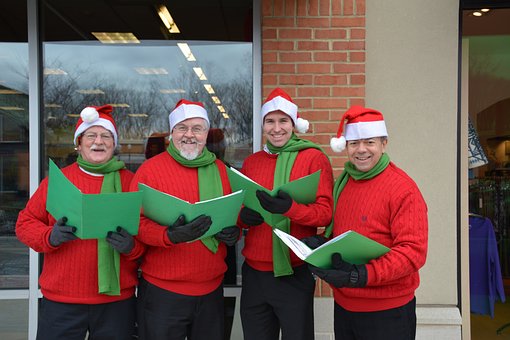 Although fewer people wander through neighborhoods singing Christmas carols, you can still find groups providing vocal music at parks, malls, and other places to spread the holiday spirit.
Although fewer people wander through neighborhoods singing Christmas carols, you can still find groups providing vocal music at parks, malls, and other places to spread the holiday spirit.Most the of the songs played are ones we know by heart because we grew up hearing them again and again. Sometimes we hear them over the radio, the television, off of youtube or maybe even streaming.
In order to discuss Christmas Caroling, we have to look back in history to see how carols and Christmas became connected.
No one is sure when caroling began. It is said that the original Carols dating back to the fourth or fifth century were written to celebrate the birth of Jesus, and were written in Latin but they were not associated with Christmas until the 13th century. St. Francis of Assisi is credited with integrating this music into Christmas services. These bright cheerful songs made a wonderful change to the traditional music of the time.
It is also said that St. Francis of Assisi incorporated music into his Nativity play in Italy. The songs were sung in Latin or in the viewer's native language so they could join in and it was said this was a way to get the carols into the communities to share the birth of Christ and these carols that spread across Europe.
It is also believed groups going out to sing carols in Churches and neighborhoods were carrying on a historical tradition of the poor who sang for food or drink. Others say groups went door to door singing because they were not allowed to perform in church while another group said the tradition did not begin until the 16th century when Christianity incorporated several Pagan traditions including wassailing.
Wassailing is a thick spiced drink given to travelers to keep them warm but over time the tradition became associated with caroling and Christmas. According to one source the original carols were passed down verbally from generation to generation and people did not begin writing these carols down until the 1500's but I don't know how true the claim is. There was a time in England between 1649 to 1660 when Oliver Cromwell banned Christmas celebrations because he believed it was a serious holiday and should not be celebrated the way it was.
Even after Christmas returned to the joyful celebration, caroling was not as popular as it had been. It wasn't until the 19th century when Victorian society enjoyed the Christmas hymns. At this time, many new carols were written and joined the old favorites sung in church and taken to the streets. These songs were published in books sold in stores to anyone who wanted them. It was easy for groups to get music to go caroling. The enjoyment of caroling has continued since then. According to a recent survey, about 16 percent of the American population still carols at Christmas time.
So as you can see, the history of caroling is interesting. Let me know what you think, I'd love to hear. Have a great day.
No comments:
Post a Comment